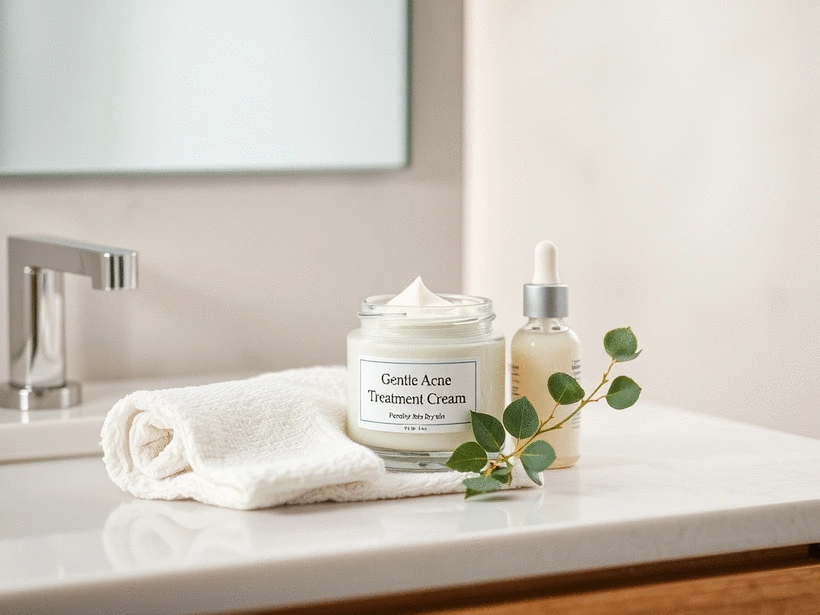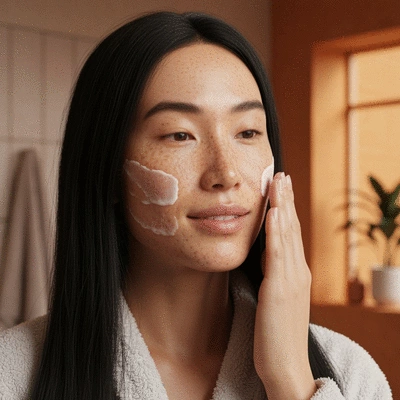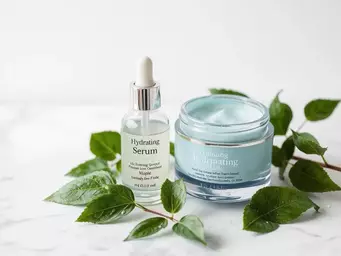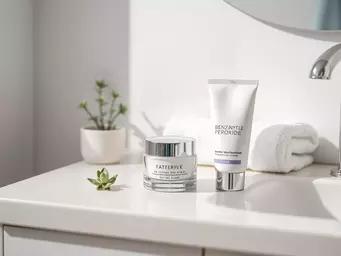Dermatologist-Approved Acne Solutions for Dry Skin

Are you grappling with the frustrating dual challenge of dry skin and acne? This common issue affects many, but understanding how to balance hydration and treatment can lead to healthier skin. Here are the essential lessons you will learn to overcome this struggle!
What You Will Learn
- The interplay between dry skin and acne and how hydration is crucial to skin balance.
- How to choose the right products, including gentle cleansers and non-comedogenic moisturizers.
- The importance of a tailored skincare routine that includes hydration and targeted treatments.
- Key dermatologist recommendations that enhance skin health, such as using ceramides and hyaluronic acid.
Understanding the Dual Challenge: Dryness & Acne
This visual represents the key strategies and dermatologist recommendations for managing the common skin challenges of dryness and acne, highlighted through a balanced skincare approach.
Understanding Acne and Dry Skin: The Common Challenge
Have you ever felt confused by your skin’s unpredictable behavior? Many individuals find themselves grappling with the dual challenge of dryness and acne. This is a common issue that can leave you feeling frustrated and unsure of how to care for your skin effectively. At Dry Acne Solutions, we understand this struggle, and it's our mission to provide you with the knowledge and tools needed to navigate these challenges successfully!
- Understanding the link between dry skin and acne
- Recognizing the importance of hydration
- Finding the right products for your skin type
Let’s explore why acne persists even in those with dry skin and how you can create a balanced skincare routine to address these issues effectively.
Why Acne Persists in Those with Dry Skin
It might seem counterintuitive, but dry skin can actually exacerbate acne. When the skin lacks moisture, it can overproduce oil to compensate, leading to clogged pores and breakouts. This cycle is frustrating, but understanding it is the first step toward better management. Hydration is crucial for maintaining skin balance, and recognizing that your skin needs both moisture and treatment is key!

Many people mistakenly think that avoiding all oils and heavy products will prevent acne. In reality, this can make the situation worse. It's essential to find the right balance that hydrates your skin without contributing to breakouts. Hydrating ingredients like hyaluronic acid and ceramides can help maintain moisture levels while treating acne effectively.
The Importance of a Balanced Skincare Routine for Acne-Prone Dry Skin
A balanced skincare routine plays a vital role in managing dry, acne-prone skin. This means incorporating products that hydrate without clogging pores. Here’s a simple framework to consider:
- Start with a gentle cleanser that removes impurities without stripping natural oils.
- Use a lightweight moisturizer to lock in hydration.
- Incorporate targeted treatments to address acne without causing irritation.
By following this routine, you can help your skin maintain its natural barrier and significantly reduce the likelihood of breakouts.
Skin Type Considerations: Identifying Your Unique Needs
Every individual’s skin is unique, and recognizing your own skin type is crucial for effective management. Do you know your skin type? Understanding if your skin is dry, oily, or a combination will help you choose the right products. At Dry Acne Solutions, we recommend conducting a simple test:
- Wash your face and leave it bare for a few hours.
- Observe how your skin feels—tightness indicates dryness, while shininess suggests oiliness.
- A combination may exhibit both characteristics, requiring tailored products.
This self-awareness empowers you to select suitable treatments and create a personalized skincare regimen that meets your specific needs. Remember, your skin journey is unique, and understanding it is the first step toward glowing, healthy skin!
Did You Know?
Research shows that over 50% of individuals with acne also experience symptoms of dry skin. This highlights the importance of understanding the relationship between hydration and acne management. Choosing the right products can make all the difference in achieving a balanced complexion!
Frequently Asked Questions About Dry Skin and Acne
- Q: Why does dry skin sometimes lead to acne?
- A: When skin lacks moisture, it can overproduce oil to compensate, which can lead to clogged pores and subsequent acne breakouts.
- Q: What are key ingredients for hydrating acne-prone dry skin?
- A: Hydrating ingredients like hyaluronic acid and ceramides are crucial for maintaining moisture levels without contributing to breakouts.
- Q: How can I identify my skin type?
- A: Wash your face, leave it bare for a few hours, and observe how it feels. Tightness indicates dryness, while shininess suggests oiliness. A combination type will show both.
- Q: What kind of cleansers should I use for dry, acne-prone skin?
- A: Always opt for gentle cleansers that hydrate while effectively removing impurities without stripping natural oils.
- Q: Are there specific acne treatments recommended by dermatologists for dry skin?
- A: Dermatologists often recommend careful use of ingredients like benzoyl peroxide, salicylic acid, and retinoids. Natural remedies like tea tree oil can also be effective with fewer side effects. It's important to introduce these gradually to avoid irritation.
Summarizing Effective Strategies for Managing Dry Skin and Acne
As we navigate the complexities of dry skin and acne, it’s crucial to reflect on the strategies that truly make a difference. Based on my experience and the latest dermatologist recommendations, here are some key takeaways that can guide you on your skincare journey:
- Always opt for gentle cleansers that hydrate while effectively removing impurities.
- Prioritize non-comedogenic moisturizers that support skin hydration without blocking pores.
- Incorporate topical treatments cautiously, focusing on those that tackle acne while minimizing irritation.
- Stay consistent with your skincare routine, as results come from patience and dedication.
These strategies can empower you to create a skincare routine that effectively addresses the dual challenges of dryness and acne. Every step you take toward understanding your skin's unique needs brings you closer to achieving that healthy glow!
Key Takeaways from Dermatologist Recommendations
When it comes to managing dry, acne-prone skin, the insights from dermatologists are invaluable. Here’s a compilation of their top recommendations:
- Focus on hydration: Adequate moisture is essential to help your skin’s barrier function properly.
- Use products with ceramides and hyaluronic acid to maintain hydration and skin integrity.
- Be gentle with exfoliation; opt for chemical exfoliants over physical ones to avoid irritating dry patches. For personalized advice on managing acne, the American Academy of Dermatology Association offers valuable insights on adult acne treatment.
- Always wear sunscreen, as many acne treatments can increase sun sensitivity.

By embracing these dermatologist-backed strategies, you can significantly improve your skin's condition and boost your confidence! Remember, the right approach can lead to healthier, more resilient skin.
Clinical Studies on the Effectiveness of Various Acne Treatments
Numerous clinical studies have explored the effectiveness of treatments for dry skin and acne. Here are some insights that stand out:
- Benzoyl Peroxide and Salicylic Acid: Both ingredients have been shown to reduce acne lesions effectively. When used in moderation, they can help clear breakouts without worsening dryness.
- Retinoids: Clinical research indicates that retinoids can effectively reduce acne and improve skin texture, but they should be introduced gradually to avoid irritation. For more information on acne diagnosis and treatment options, consider resources like the Mayo Clinic's comprehensive guide to acne.
- Natural Remedies: Studies on tea tree oil have shown it can reduce acne lesions with fewer side effects compared to traditional treatments.
Understanding the science behind these treatments can guide you in making informed choices. Always consider consulting with a dermatologist when exploring new options!
Taking the Next Steps: Finding the Right Products and Support
Once you've grasped effective strategies, the next step is to take action. Finding the right products tailored to your unique skin challenges is essential. Here’s how you can approach it:
Consulting with Your Dermatologist for Personalized Care
Every person’s skin is different, especially when managing dry and acne-prone conditions. That's why I always recommend scheduling a consultation with your dermatologist. They can:
- Conduct a thorough assessment of your skin type and concerns.
- Prescribe treatments best suited for your unique needs.
- Help you navigate product recommendations based on clinical evidence.
With personalized care, you’re better positioned to tackle your skin challenges head-on!
Building a Long-Term Skincare Plan for Lasting Results
Creating a lasting skincare plan is crucial for long-term success. Here are the steps you can take:
- Set realistic goals for your skin health, knowing that change takes time.
- Regularly review and adjust your routine based on your skin’s response.
- Incorporate seasonal adjustments to address environmental changes that affect your skin.
Being proactive in your approach will help ensure that your routine continues to meet your skin's needs as they evolve.
Exploring Cosmeceuticals for Enhanced Skin Health
Cosmeceuticals bridge the gap between skincare and pharmaceuticals, offering products with therapeutic benefits. Here are a few categories worth exploring:
- Anti-aging serums: Formulated with active ingredients like peptides that can promote skin renewal.
- Brightening agents: Ingredients like vitamin C can help even out skin tone and enhance radiance.
- Soothing treatments: Look for products with soothing botanicals to reduce inflammation and redness.
Incorporating cosmeceuticals can provide additional support in your journey toward clear, healthy skin!
Recap of Key Points
Here is a quick recap of the important points discussed in the article:
- Understand the connection between dry skin and acne, recognizing that dryness can lead to excess oil production and breakouts.
- Prioritize hydration in your skincare routine by using products with hydrating ingredients like hyaluronic acid and ceramides.
- Adopt a balanced skincare routine that includes gentle cleansers, lightweight moisturizers, and targeted treatments for acne.
- Identify your skin type to tailor your product choices effectively and ensure that your routine addresses your unique needs.
- Stay consistent with your skincare regimen, as results require patience and dedication.
- Consult a dermatologist for personalized advice and product recommendations tailored to your skin's specific challenges.









